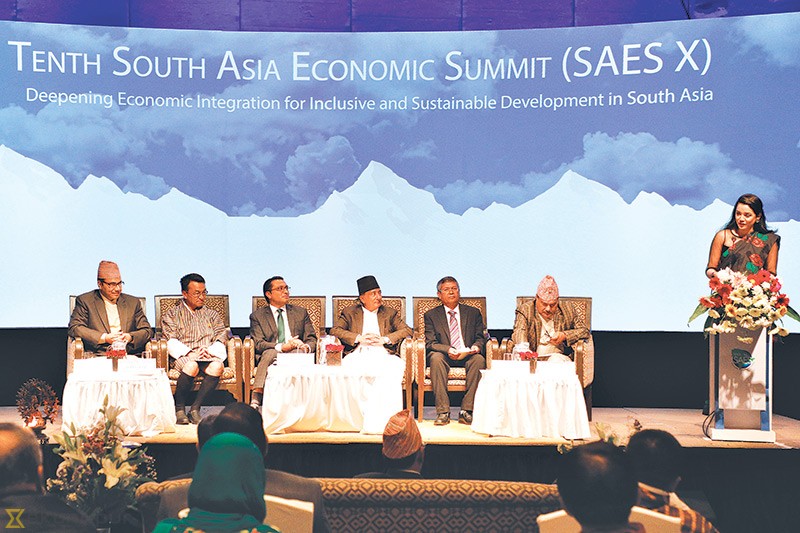South Asia economic summit makes renewed regional integration call

Participants of the 10th edition of South Asia Economic Summit in Kathmandu on Tuesday. THE KATHMANDU POST
The 10th edition of South Asia Economic Summit kicked off in Kathmandu on Tuesday with renewed calls for rapid development of physical infrastructure and removal of non-tariff barriers to expedite regional integration.
The region has been talking about regional integration since the establishment of the South Asian Association for Regional Cooperation (Saarc), a bloc of eight South Asian countries, in 1985. The overarching goal of deeper regional integration is to create a common marketplace where people can live in peace and become prosperous.
The issue of regional integration takes the centre stage in most of the South Asian summits like the one that started on Tuesday. Yet the volume of intra-regional trade—just one barometer to gauge the progress made in integration—currently stands at 6.9 percent of the total trade in South Asia, up from 5.6 percent in 2006 when South Asian Free Trade Agreement was implemented. The slow growth in intra-regional trade is the result of high transportation cost, lack of proper physical infrastructure, cumbersome regulatory requirement, poor communication linkages and presence of non-tariff barriers, according to experts. No wonder, it is cheaper for Sri Lanka to trade with Brazil today than with Nepal, studies have shown.
“Clearly, we haven’t been able to match lofty aspiration of regional integration with concrete measures,” said Swarnim Wagle, vice chairman of Nepal’s National Planning Commission, the apex body that frames the country’s development plans and policies, and the main organiser of the summit being held with the theme, ‘Deepening Economic Integration for Inclusive and Sustainable Development in South Asia’. “Hence, it is essential to build credible building blocks,” Wagle added.
Some of these building blocks, according to Wagle, could be reduction in trade cost between South Asian nations; creation of a business friendly environment and revival of manufacturing sector; relaxation in flow of capital across the border in the region; connectivity and consolidation of economic corridors; optimal use of
surplus power; and creation of a customs union in the long run.
These deficiencies indicate South Asia needs to do a lot to catch up with other regional blocs like the Association of Southeast Asian Nations (Asean). Yet there is hope in the region because of robust economic growth over the years. South Asia, home to 1.7 billion people, remained the fastest-growing region in the world since the second quarter of 2014.
And its growth reached a record high of 9.1 percent in the first quarter of 2016. Although the region no longer holds the top position, many are optimistic about the region’s prospects as it has just started tapping many of its potentials. “We can achieve a lot in the coming days if we do two basic things,” Lyonpo Lekey Dorji, Bhutanese minister for economic affairs, told the inaugural session of the summit, which will continue till Thursday. “First is cooperation in energy sharing in the region. Second is cooperation in movement of goods and services.”
Trade facilitation—which enables goods and services to move across borders smoothly—and energy sector development—which provides South Asian countries access to electricity required to power various industries—have remained high on the agenda of South Asian countries for long. Efforts to attain these goals are being made through implementation of a programme called South Asia Sub-regional Economic Cooperation (Sasec), under which 209 projects worth $121.5 billion are in the process of being rolled out with the support of the Asian Development Bank.
“Effective implementation of Sasec will go a long way in liberalising the South Asian market,” Abdul Latheef Mohamed, Maldivian minister of state for economic development, told the summit co-organised by Ministry of Commerce, Nepal and South Asia Watch on Trade, Economics and Environment, a think-tank based in Nepal. The summit is being attended by around 200 government officials, policymakers, politicians, development experts, academicians, civil society actors, and people of the business community from across South Asia.
The inaugural session of the summit also saw participation of Nepali Finance Minister Gyanendra Bahadur Karki and Nepali Commerce Minister Meen Bahadur Bishwakarma.














